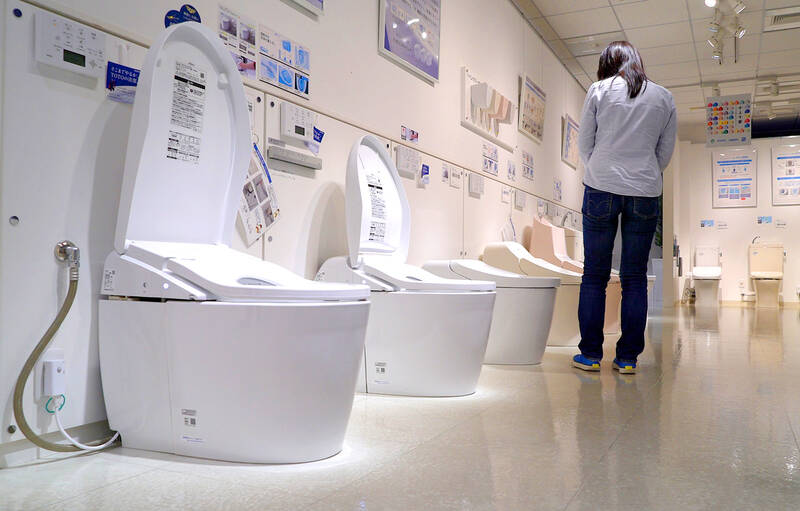Lawmakers on Thursday questioned a plan by the Ministry of Environment to visit Tokyo to study toilet design, with the Social Welfare and Environmental Hygiene Committee expressing concerns that the visit would instead be more like a vacation.
The trip’s aim is to learn from Japan’s use of artificial intelligence (AI) and Internet of Things (IoT) technology in public restrooms to monitor odor and optimize cleaning schedules, the ministry said, adding that Taiwan’s own program to improve its public restrooms has not made the expected progress.
Chinese Nationalist Party (KMT) Legislator Su Ching-chuan (蘇清泉) said the ministry has proposed five overseas trips, with budgets from NT$160,000 to NT$400,000, and that each trip should have 10 percent of its budget frozen.

Photo: Reuters TV via REUTERS
Environmental Management Administration Director-General Yen Hsu-ming (顏旭明) said that prior to the Olympics, Tokyo renovated 17 public restrooms in innovative and modern ways.
Learning from those examples could greatly improve the quality of Taiwan’s public restrooms, Yen said, adding that this type of trip was the first of its kind.
In response to Su’s concerns about the trip being an excuse to enjoy Tokyo, Yen said that “it is difficult to eat and drink” in a restroom, and that he hoped the trip’s already modest budget would not be reduced.
The committee reduced combined funding for the five trips by NT$100,000.
Democratic Progressive Party Legislator Liu Chien-kuo (劉建國) said the ministry has been working to improve Taiwan’s restrooms since before it was an independent ministry and questioned why a visit abroad was necessary.
In response, Yen said that in the past, managing public restrooms was focused on cleanliness, rather than ensuring that they are comfortable for all groups, are modern or are examples of public art.
Minister of Environment Peng Chi-ming (彭啟明) said that in the future, Taiwan’s restrooms could follow the example of Tokyo’s latest designs, such as by having smart sensors to proactively detect odors and increasing cleaning frequency.

Chinese Nationalist Party (KMT) Chairman Eric Chu (朱立倫), spokeswoman Yang Chih-yu (楊智伃) and Legislator Hsieh Lung-chieh (謝龍介) would be summoned by police for questioning for leading an illegal assembly on Thursday evening last week, Minister of the Interior Liu Shyh-fang (劉世芳) said today. The three KMT officials led an assembly outside the Taipei City Prosecutors’ Office, a restricted area where public assembly is not allowed, protesting the questioning of several KMT staff and searches of KMT headquarters and offices in a recall petition forgery case. Chu, Yang and Hsieh are all suspected of contravening the Assembly and Parade Act (集會遊行法) by holding

PRAISE: Japanese visitor Takashi Kubota said the Taiwanese temple architecture images showcased in the AI Art Gallery were the most impressive displays he saw Taiwan does not have an official pavilion at the World Expo in Osaka, Japan, because of its diplomatic predicament, but the government-backed Tech World pavilion is drawing interest with its unique recreations of works by Taiwanese artists. The pavilion features an artificial intelligence (AI)-based art gallery showcasing works of famous Taiwanese artists from the Japanese colonial period using innovative technologies. Among its main simulated displays are Eastern gouache paintings by Chen Chin (陳進), Lin Yu-shan (林玉山) and Kuo Hsueh-hu (郭雪湖), who were the three young Taiwanese painters selected for the East Asian Painting exhibition in 1927. Gouache is a water-based

Taiwan would welcome the return of Honduras as a diplomatic ally if its next president decides to make such a move, Minister of Foreign Affairs Lin Chia-lung (林佳龍) said yesterday. “Of course, we would welcome Honduras if they want to restore diplomatic ties with Taiwan after their elections,” Lin said at a meeting of the legislature’s Foreign Affairs and National Defense Committee, when asked to comment on statements made by two of the three Honduran presidential candidates during the presidential campaign in the Central American country. Taiwan is paying close attention to the region as a whole in the wake of a

OFF-TARGET: More than 30,000 participants were expected to take part in the Games next month, but only 6,550 foreign and 19,400 Taiwanese athletes have registered Taipei city councilors yesterday blasted the organizers of next month’s World Masters Games over sudden timetable and venue changes, which they said have caused thousands of participants to back out of the international sporting event, among other organizational issues. They also cited visa delays and political interference by China as reasons many foreign athletes are requesting refunds for the event, to be held from May 17 to 30. Jointly organized by the Taipei and New Taipei City governments, the games have been rocked by numerous controversies since preparations began in 2020. Taipei City Councilor Lin Yen-feng (林延鳳) said yesterday that new measures by